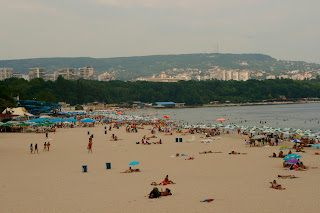I started blogging my Eastern European excursion a few months ago with the question: Is the Blue Danube blue? (see Danube River on sidebar) Now I must grapple with: Is the Black Sea black? From my view in Varna, Bulgaria, the sea had a gray-green tinge. I understand that Bulgaria's 235 miles (378 km) of Black Sea coast have some of the most beautiful beaches in the area with rich turquoise waters.
Yet, the Turks called it the Black Sea, and that name may be even more ancient. It certainly is a sea dark with mystery. It connects to the Mediterranean through the Turkish straits of the Dandanelles, Sea of Marmara and the Bosphorus, but the oxygenated upper waters of the Sea do not mix with the lower strata, and 90% of the Black Sea is dark and anoxic--without oxygen. Very little can live in such conditions, but it has an extraordinary ability to preserve whatever rests on the shelves or bottom. Even though it is hard to find things in its dark waters, ancient ships that have been recovered are in remarkably good condition. Legends connect the Black Sea with Noah's flood, and some claim that the remnant of the Ark rests across the Sea on Mt. Ararat in Turkey. So, yes, under the surface, it is a black sea.
Today, Varna is the largest sea port city in Bulgaria. Evidence of civilization goes back to the Neolithic age at about 5500 BC. In 1972, there was an amazing find in the outskirts of Varna of 281 grave sites from about 5000-45000 BC, with the earliest evidence of worked gold in Euroasia.
The Archaeological Museum has the golden rings, bulls, and other ornaments displayed as they were found in the graves along with axes, dishes, obsidian from Hungary, and prized shells from the Mediterranean. Because few shelled creatures can live in the Black Sea, Mediterranean shells appeared to be more valuable to them than the gold which was brought from other parts of Bulgaria. In fact, items in the graves of this unknown civilization came from an area of more than 1,543 miles. The Museum held other fascinating displays of intricate Thracian jewelry (from 1,000 BC) and statues and tombs through the Greek and Roman eras. Varna was then known as Odessos.

 It is hard to separate my memories of Varna from the humidity and heat we experienced (100' F; 38' C). We left our boat at the Danube port of Rousse and enjoyed an air-conditioned bus for a couple of hours to Varna (with a petrol/snack stop midway). After visiting the amazing Archealogical Museum, we wandered shady, wide pedestrian boulevards, peeking into a neighborhood church to seek relief from the heat. Instead of walking to the end of the boulevard to the famous Sea Gardens as I intended, I stopped at a great gelato stand and sat in a shaded park, listening to the unexpected sounds of Native American instruments by some local street performers.
It is hard to separate my memories of Varna from the humidity and heat we experienced (100' F; 38' C). We left our boat at the Danube port of Rousse and enjoyed an air-conditioned bus for a couple of hours to Varna (with a petrol/snack stop midway). After visiting the amazing Archealogical Museum, we wandered shady, wide pedestrian boulevards, peeking into a neighborhood church to seek relief from the heat. Instead of walking to the end of the boulevard to the famous Sea Gardens as I intended, I stopped at a great gelato stand and sat in a shaded park, listening to the unexpected sounds of Native American instruments by some local street performers.  Varna seemed to be a fast food town. If you didn't want to eat at one of the numerous McDonald's, you could try Godzilla's BBQ, Turkish kebabs, or Grandma's home cooking. Instead, passing by Roma gypsy shanties with modern satellite disks, we were taken to Mr. Baba's Pirate Ship restaurant on the beach. Although the "pirate ship" looked like a fun place to eat, I was seated in an area with poor air circulation and was disappointed by slow service and mediocre food. We then had a few moments to walk on the beach and dip our feet into the Black Sea. The beach was not very crowded, but was littered. Despite being hot and tired, I was still excited that I was finally at the Black Sea-- that mysterious body of water I had barely glimpsed on a river excursion on the Bosphorus years ago in Turkey. Varna was worth the journey.
Varna seemed to be a fast food town. If you didn't want to eat at one of the numerous McDonald's, you could try Godzilla's BBQ, Turkish kebabs, or Grandma's home cooking. Instead, passing by Roma gypsy shanties with modern satellite disks, we were taken to Mr. Baba's Pirate Ship restaurant on the beach. Although the "pirate ship" looked like a fun place to eat, I was seated in an area with poor air circulation and was disappointed by slow service and mediocre food. We then had a few moments to walk on the beach and dip our feet into the Black Sea. The beach was not very crowded, but was littered. Despite being hot and tired, I was still excited that I was finally at the Black Sea-- that mysterious body of water I had barely glimpsed on a river excursion on the Bosphorus years ago in Turkey. Varna was worth the journey. Though Varna is a modern and happening city, I ended up choosing Rimsky-Korsokov's "Scheherazade" with its touch of the mysterious for the slideshow.
Though Varna is a modern and happening city, I ended up choosing Rimsky-Korsokov's "Scheherazade" with its touch of the mysterious for the slideshow.Click link below for slideshow:
The Black Sea and Varna
Music: Nikolai Remsky-Korsakov, Sheherazade: The Young Prince and the Young Princess, The Philadelphia Orchestra with Eugene Ormandy




No comments:
Post a Comment